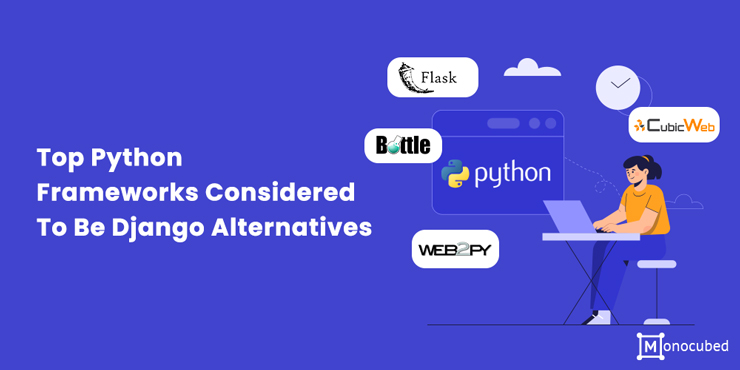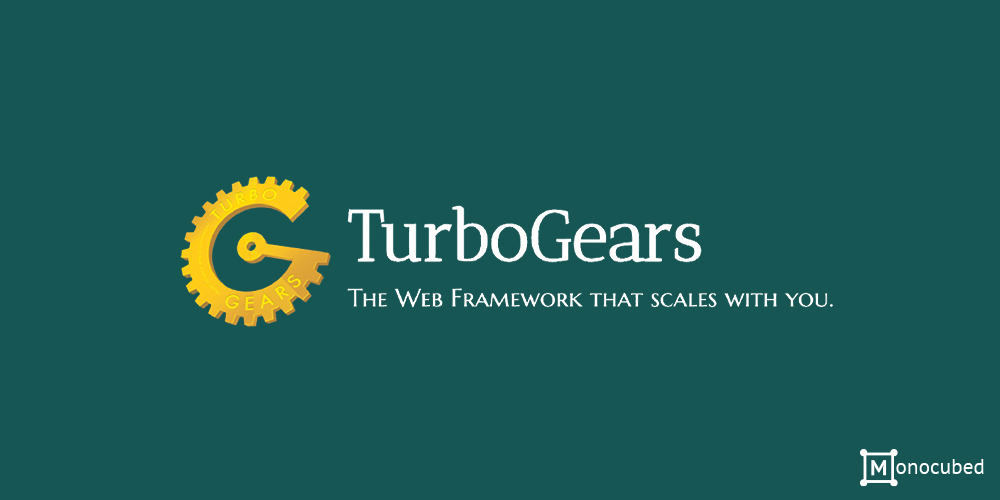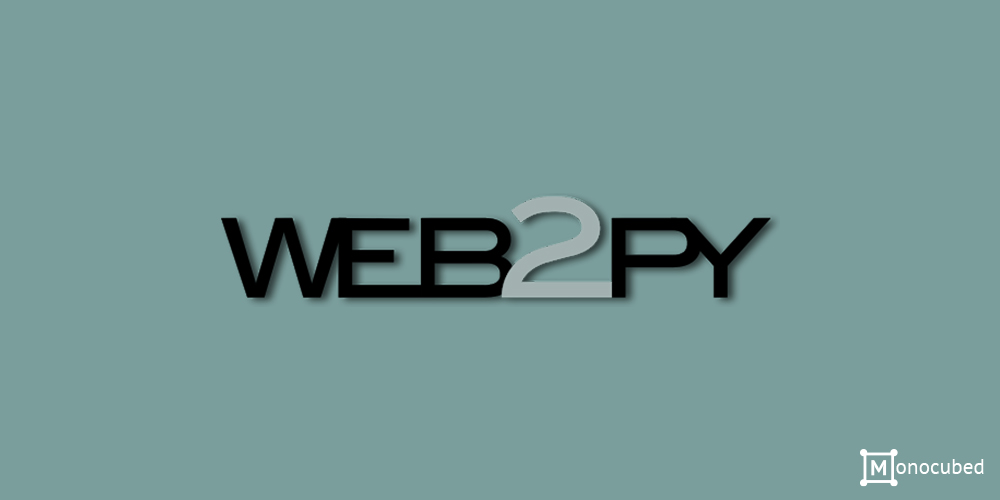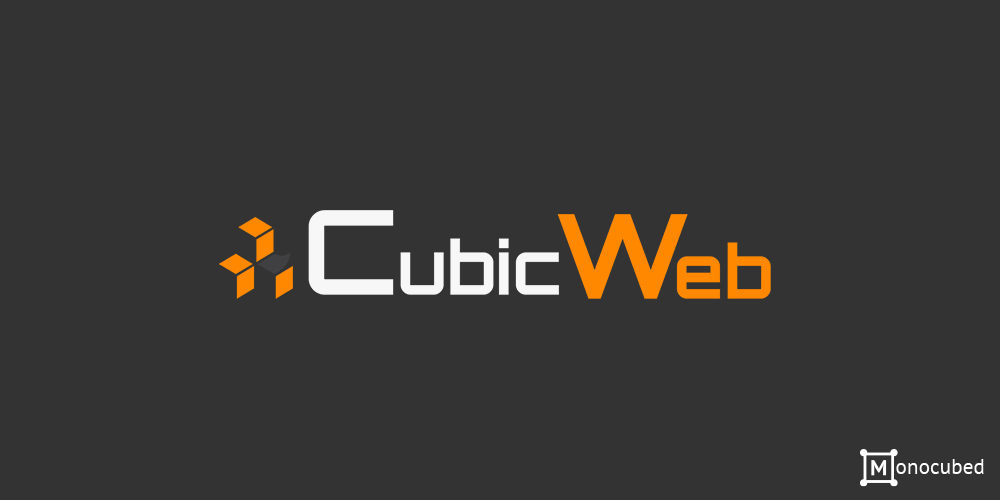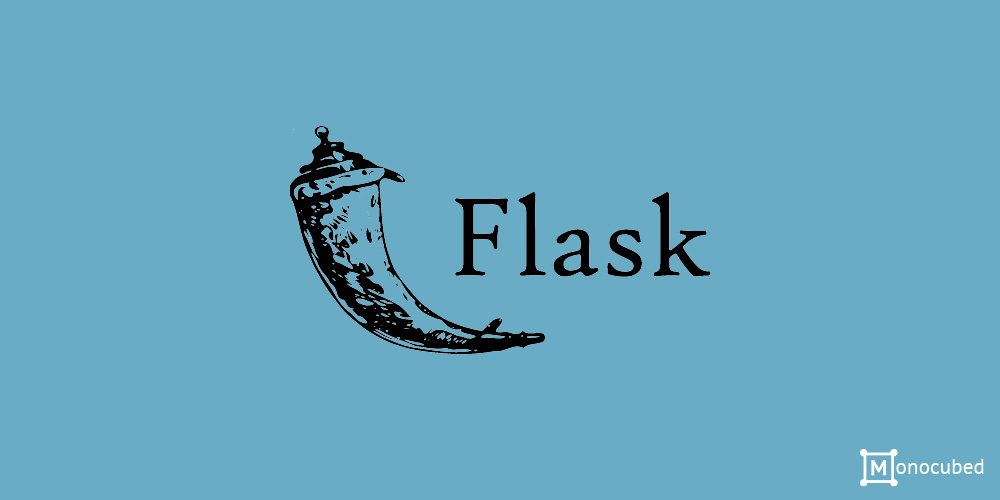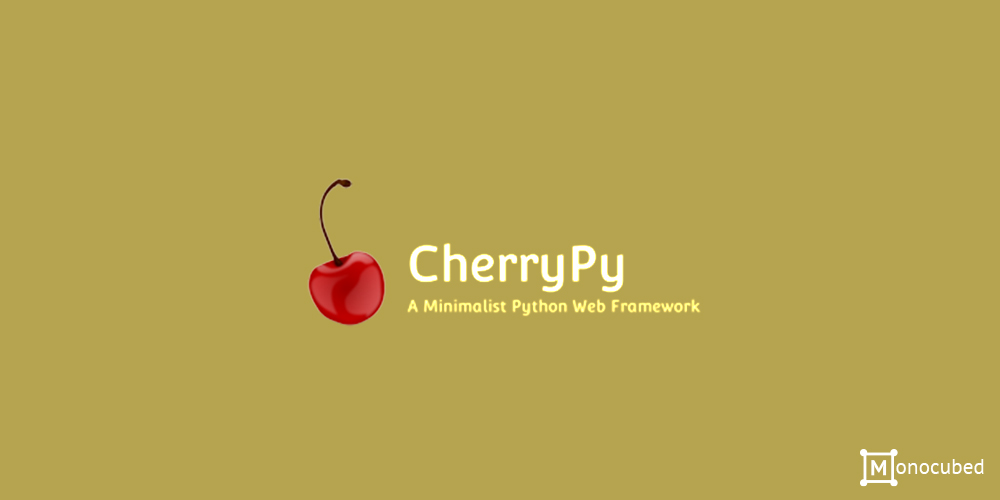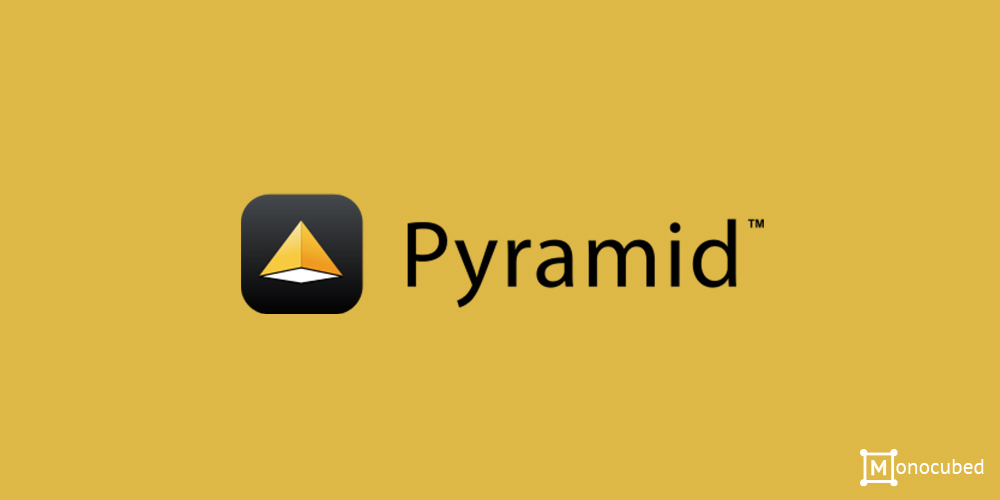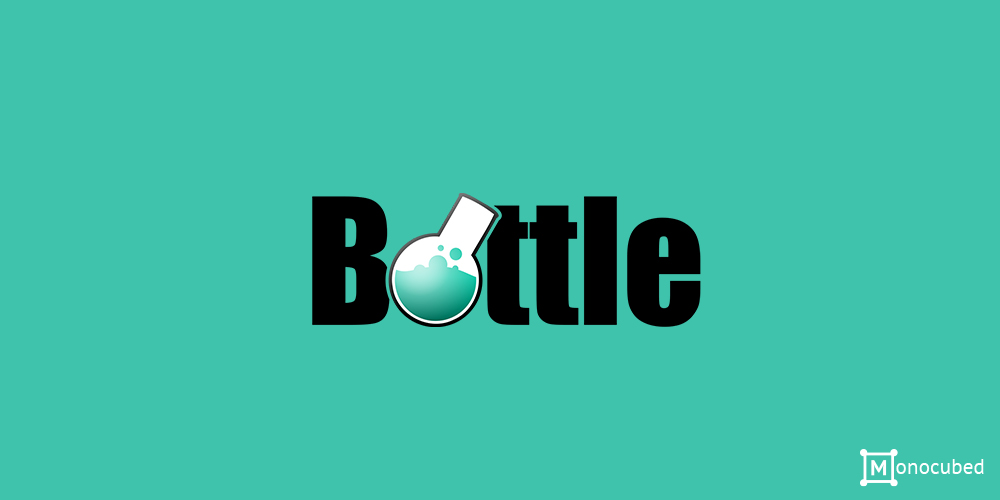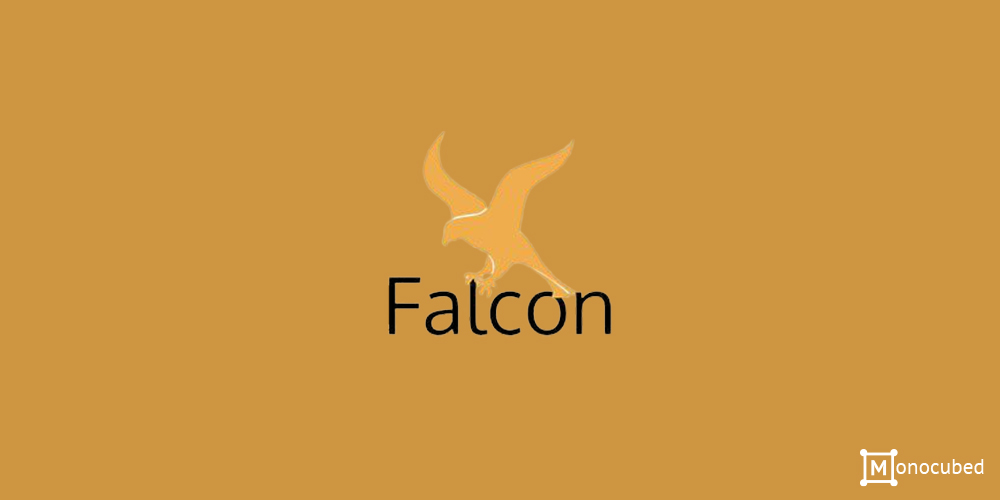Web frameworks are an essential aspect of developing user-driven web apps. They provide structure to web applications, increasing the productivity and efficiency of developers.But new development trends have resulted in a massive number of innovative frameworks and tools. Keeping track of new tech can become cumbersome.
One such popular web framework to use is Django. It has been steadily increasing in popularity since its release and still continues to be a favorite among Python developers.
However powerful it is, Django can not suit every web project. It can get slow, restrictive, and monolithic for small-scale projects. It becomes necessary to look at alternative frameworks in such cases.
Thus, we bring to you the best web frameworks you can use as Django alternatives for your next web project. While some alternatives are based on Python like Django, we also list some popular web frameworks for other programming languages.
Table of Content
What is Django?
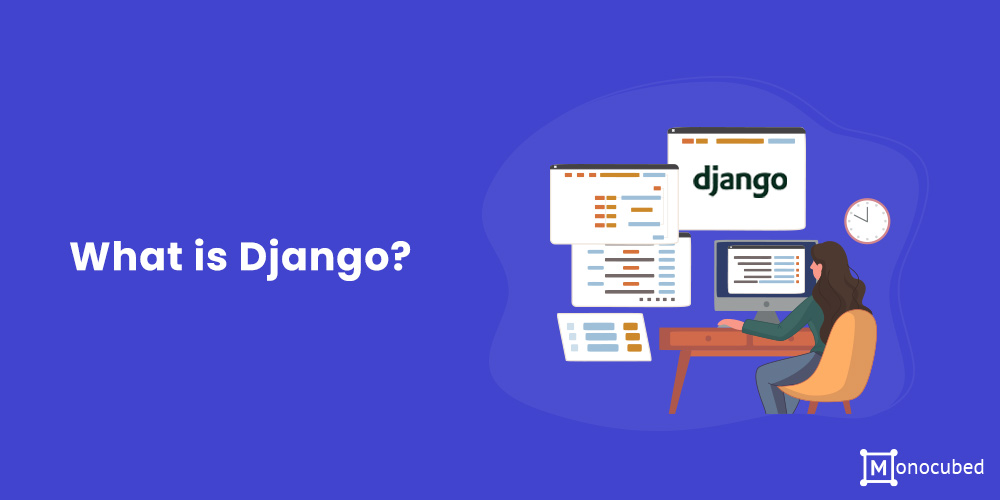
Django is a high-level, open-source web framework that encourages rapid development. Used in web development of Python programming language, it ensures the implementation of a clean pragmatic application design.
Django comes with most of the common libraries and tools required for web development and is therefore called a batteries-included framework. It requires no additional installation.
The Django web framework offers a complete suite of features such as data binding, boilerplate coding, flexibility, reusability, high productivity, and extensibility. You have access to a standardized frame that takes care of the hassle of web development, so you don’t have to reinvent the wheel.
Companies like Bitbucket, Pinterest, Instagram, and Onion use Django in their tech stack to produce engaging user experience.
Why Django?
Some positives of using Django are its MVC-MVT design architecture and the powerful components-based framework. Another point of importance is that Django includes all the functionalities to secure websites and helps developers avoid web security mistakes.
These are some of the most important benefits of Django. Other advantages of the web framework are-
- Django applications are secure from common vulnerabilities and security attacks by default
- It implements stringent rules and conventions that the developers have to follow. Although this can be limiting and restrictive, it also ensures standardized coding practices, uncomplicated testing and debugging, and working application architecture.
- It mainly focuses on high-level processes.
- Several small uncomplicated applications can be formed as components and compiled together to form a Django web application.
- Django is completely based on Python. It strictly follows the paradigms and concepts of the programming language, “Don’t Repeat Yourself” philosophy, duck typing, and reusability.
You can read our blog on 10 Reasons Why Use Python For Web Development in 2022 to know why Python is a good web language. - It is extremely easy to scale a Django app. Instagram is the best example of Django’s powers. The first prototype was designed in a matter of days and with increased usage, the Instagram web application kept scaling to handle more than 1000 million users today.
- URL routing, template engine, a powerful ORM, and many database schema migrations are available for easy accessibility
- It has massive support for developing RESTful Web APIs using the Django REST framework.
Want to Amp Up Your Web App?
Use Django to take your web app idea to the next level with advanced AI features. Talk to our expert to validate your idea for free.
Why Look For Django Alternatives?
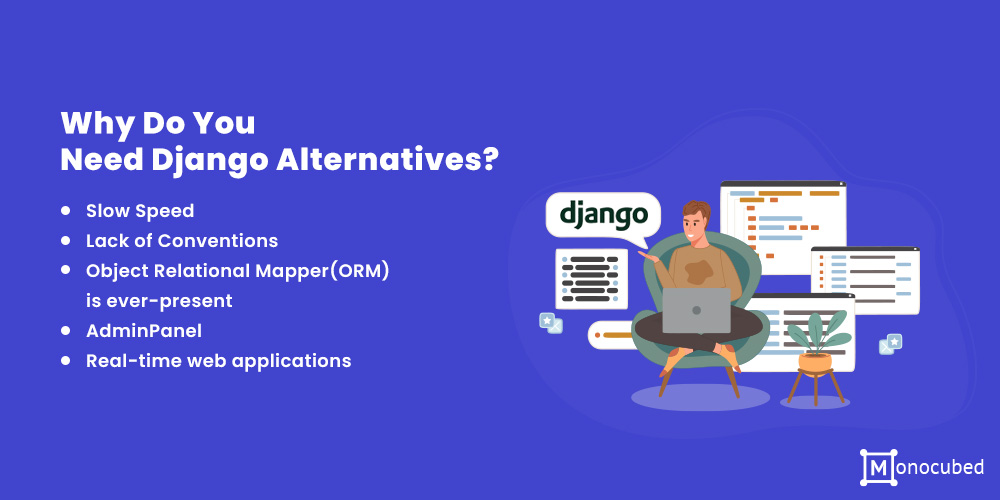
Although Django is one of the most popular Python frameworks, it also has its own pitfalls and drawbacks. Its size and monolithic structure can prove to be a hassle when working on a simple single-page web app. Some cons of using Django as a framework are –
Slow Speed
Python in itself is a very slow programming language. Adding Django’s full-stack nature and dynamically typed paradigm, results in a very slow framework. It is very important to design the application architecture correctly or developers will face some serious issues with speed. It is comparatively slower than other backend frameworks.
Lack of Conventions
Everything has to be explicitly defined by developers in Django. There is no standardization or a default configuration available. This lack of convention in Django results in a lot of extra time spent in developing the source code. Besides, developers need to fully understand each concept before implementing it correctly.
ORM is ever-present
The Object Relational Mapper(ORM) of Django cannot be disabled. Everything in Django requires using the ORM be it frontend or backend development. Although the ORM is very powerful and useful in situations handling large databases, it can create problems. You have to manually change the ORM when you are performing simple tasks such as designing a UI element.
Automatic Admin Panel
Certain internal Django modules, such as the powerful admin panel, are sometimes tough to work with. The admin panel is automatically generated every time by the framework. This can be super helpful, but also extremely cumbersome for small static websites. You need to work for hours on reconfiguring the modules if you want to generate dynamic statistics and links.
Real-time web applications
WebSockets is a web service that allows you to update events or content in real-time. But Django does not support web sockets yet. Therefore it is hard to develop real-time web applications with dynamic content and live information updates.
Check out the detailed comparison between Django and Node.js, to find which one is best to utilize.
Alternative Python Web Framework
Django is a full-stack framework for the Python programming language. As discussed, although it has many advantages, there are also some drawbacks of using Django that can averse a developer from using it.
But Python is a very popular language and comes with a lot of development tools, libraries, and frameworks. As a Python web development company, we utilize many tools and frameworks regularly in our projects.
There are mainly two types of frameworks – Full-stalk and microframework. Let’s look at some alternative frameworks of both types which you can use instead of Django.
Full-stack frameworks such as Django, come pre-equipped with all the functionalities for developing an interactive web application. They include server configurations, business logic components, testing and debugging features, security protocols, and deployment settings.
Full-stack Framework
Using a full stack framework enables the following benefits-
- It is complex and monolithic, doing all the heavy lifting for developers
- Can be used to make medium to large-sized applications
- Provide libraries, template engines, database management etc.
Some full-stack Python frameworks that can act as a Django alternative are –
Turbogears
Based on the MVC (Model-View-Controller)design pattern, TurboGears is a full-stack framework for developing web applications. It is flexible, portable, and comes with a fully integrated MochiKit Javascript library.
TurboGears applications can be deployed on any web server that supports the WSGI Python interface. In addition, it comes attached with Gearbox, a command-line interface for managing projects, and Kajiki, a templating engine.
It is perfect for handling database-driven websites as it has an open-source SQL kit known asSQLAlchemy. It also has support for SQLObject, which is a powerful Object-relational mapping package, that lets you write server-side code very quickly, in just a few days.
TurboGears can be considered the best alternative to Django, if you are looking for a framework that is most similar to Django. Both have powerful template engine, high-powered ORM, database support, and are extensible, but TurboGears is not as opinionated.
Web2py
Web2py is a web-based framework that allows you to create, modify, deploy and manage apps from anywhere using your browser. It is a cross-platform framework that can be used on multiple devices and browsers. It also deploys a powerful error logging and ticketing system.
Web2py has no dependencies outside of the Python standard library. It requires no prerequisites for installation or configuration. Along with backward compatibility, it also has security measures against attacks such as cross-site scripting, SQL injection and other malicious attacks.
It has a fully-featured IDE, which allows you to change the content on your website from any web browser, even after it is deployed. You can develop fast, scalable, secure database-driven web applications with Web2py.
CubicWeb
CubicWeb is a free, open-source semantic web application framework that works on a data model. Developers can develop web applications efficiently by reusing components called cubes. It employs object-oriented design principles and has an embedded query language.
CubicWeb also includes Relational Query Language(RQL) which simplifies data-related queries using a simple syntax. You are able to manage relationship queries, data repositories, and view attributes.
CubicWeb offers semi-automatic mechanisms for handling XML and JSON code generation, and workflow with security. Large-scale semantic websites and linked open data apps are good for using CubicWeb.
Microframework
Django, as discussed, can sometimes be monolithic. Other full stack frameworks can also be too complex for small, basic websites and applications that do not require a lot of features. Python has a series of well-designed micro frameworks such as Flask, Bottle and CherryPy that work perfectly with small-scale websites.
Some advantages of using micro-frameworks are –
- Simple, easy to use, lightweight, and small footprint
- URL routing through REST API
- A good choice for small web projects such as static websites or one page applications
- Uses WSGI to work with HTTP request
For smaller, lightweight alternatives of Django, you can consider one of the following server-side Python frameworks –
Flask
Flask is a microframework that is suitable for small projects that need a fast way to make a simple, Python-powered website.It is highly scalable and thus suitable for startups. You can develop a basic application to start with and then scale up to a meet increasing user traffic.
It powers many small tools and simple web interfaces built over existing APIs. It utilizes microservices and micro-frontends, to reduce the loading time of a webpage.
Flask comes with many configuration values, along with a few easily customizable defaults, and a few conventions. It also implements common security measures such as session-based management, password hashing, HTTP authentication, and cross-site request forgery(CSRF) for protection against vulnerabilities.
Flask has a built-in development server and is fully Unicode-enabled while also supporting unit testing, RESTful request dispatching and WSGI compliance.
If you are working on backend projects and want a simple web interface, Flask is the best option for you. It is very fast in developing frontend and will require very few configurations.
Create Your Custom Web-based Solution
Let’s discuss. Be it a complex eCommerce solution or a simple landing page, we can help you develop a custom web solution.
CherryPy
CherryPy is a python based, object-oriented web development framework. It provides built-in capital plugins and a powerful configuration system.
CherryPy also includes an implementation of the Ruby programming language framework. It incorporates the Ruby on Rails’s routing system in Python. You can generate and map URLs to controllers.
CherryPy requires minimal lines to write the source code resulting in low development time and high productivity.
It is a very lightweight alternative for Django and one of the oldest Python frameworks. CherryPy has built-in tools for coding static web pages, URL encoding, user authentication, and session management. It is also embedded with a powerful configuration system that can handle multiple HTTP requests and run multiple HTTP servers simultaneously.
Pyramid
Pyramid is the most flexible Python framework available.A lightweight, scalable framework, Pyramid is used for developing small to large-scale web apps. It is also great for quick prototyping and for developers who are working on API projects.
Pyramid has a small footprint but it is easily extendable with add-ons, configurations and libraries to include unique functionalities in your app. It sometimes provides so many options that it can get tough to make the right choices in a new project.Major companies such as Dropbox, Fedora, Mozilla, SurveyMonkey, and Yelp use Pyramid for website development.
Bottle
The bottle is a simple, fast, and lightweight web-based framework distributed as a single file module. It works on any Python WSGI compliant server and is mainly used for building APIs. It is also a preferred choice for building simple prototypes.
It has support for various databases and URL parameters along with the built-in template engine SimpleTemplate. It is also highly flexible and allows you to integrate third-party templating engines such as Mako, Jinja2, or Cheetah. There are plugins and external libraries available for ORM support, NoSQL database, and admin panels.Falcon
Falcon is a reliable, high-performance Python WSGI library for rapid backend development. It is mainly used for micro web services, Web API, web sockets, and backends of large-scale applications. It encourages usage of REST architectural style, very much like the Django Rest framework, and tries to do as little as possible.
It is highly effective and cuts down internal dependencies by using a clean HTTP and REST framework architecture design. High performance with a significantly lower code base, Falcon is a minimalistic alternative to Django.
Some Other Alternatives for Django Framework
If you are willing to experiment with other programming languages, we have a list of the best frameworks for different web scripting languages such as PHP, JavaScript, Go, and Ruby.
- Ruby alternative – Ruby on Rails
- JavaScript alternative -Node.JS, EmberJS
- PHP alternative – CodeIgniter, Laravel, Symfony
- Go alternative – Gin
- TypeScript alternative – Angular, Next.JS
All the above frameworks are exceptionally good for server-side development. While the PHP framework CodeIgniter is well suited for eCommerce projects, Ruby-based, Ruby on Rails is best for start-ups. We have answered some common questions in the FAQ section. Feel free to contact us anytime, if you have any queries or a web idea we can help you bring to fruition.
Frequently Asked Questions
Is Django worth using in 2022?
Django is a robust Python framework that has been used by web developers for years. There is no sign of decreasing popularity for Django. It is a mature framework that continues to grow with third-party ecosystems and tools. With each new update, Django receives advanced features. It is definitely worth using for large-scale web applications.
Is Django better than Rails?
In terms of scalability, ease of use, and security Django fares much better than Ruby on Rails. With readable syntax, pragmatic design, and extensive core libraries, Django is definitely better for case-specific personalized web apps. But if you compare speed and performance, Ruby on Rails is faster than Django.
Will Flask overcome Django?
No. Flask and Django are two competent Python frameworks that have a widely different development approach. Flask cannot replace Django as it is meant to be a microframework that offers components and scales with your needs. Django, on the other hand, is a complex ‘batteries-included’ full-stack framework.
Conclusion
Django is one of the best web frameworks for developing scalable complex applications. But there are many times when Django fails. You can use alternatives to Django such as Flask, CherryPy, TurboGears in such cases. These are more productive web frameworks that can be used for a more performative and flexible website.
Node.JS, Laravel, React are some non-Python frameworks that are also good alternatives for Django if you are comfortable with other programming languages.
Still unsure which framework to choose? Contact our IT experts for assistance in choosing a Django alternative. If you have some projects in mind, our developers can also help you develop suitable web solutions.
You can reach out to us for assistance with web development services at Facebook or Twitter.
 By Jeel Patel
By Jeel Patel
